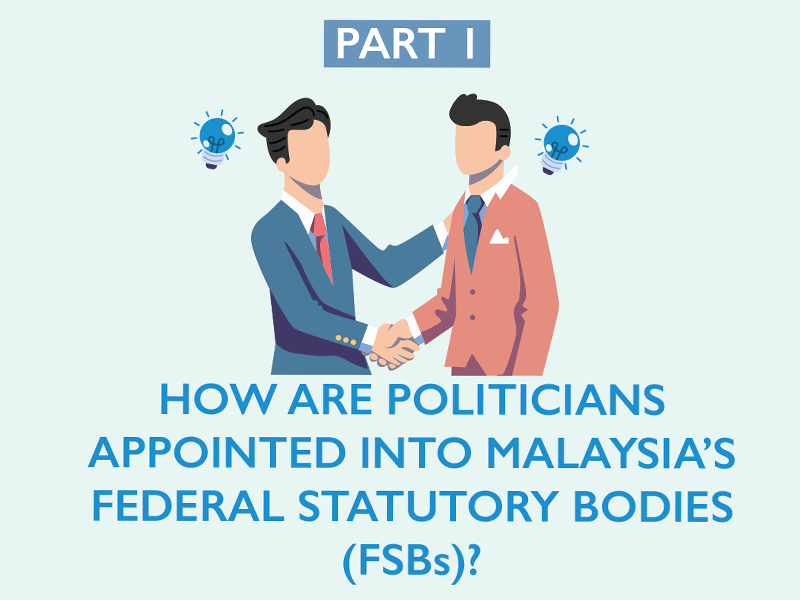
How are politicians appointed into Malaysia’s Federal Statutory Bodies (FSBs)? Part 1
As Federal Statutory Bodies (FSBs) are set up by the act of parliament, the appointment of board members are subject to their regulation act. The act clearly says who shall appoint them, who can be appointed, and what are the criteria.
However, how do politicians get appointed to FSBs? Are their appointments in line with the law? Do they still have to go through the same process of appointment as non-politicians?
To discover those questions, let’s see how and who appoint politicians into the FSBs.
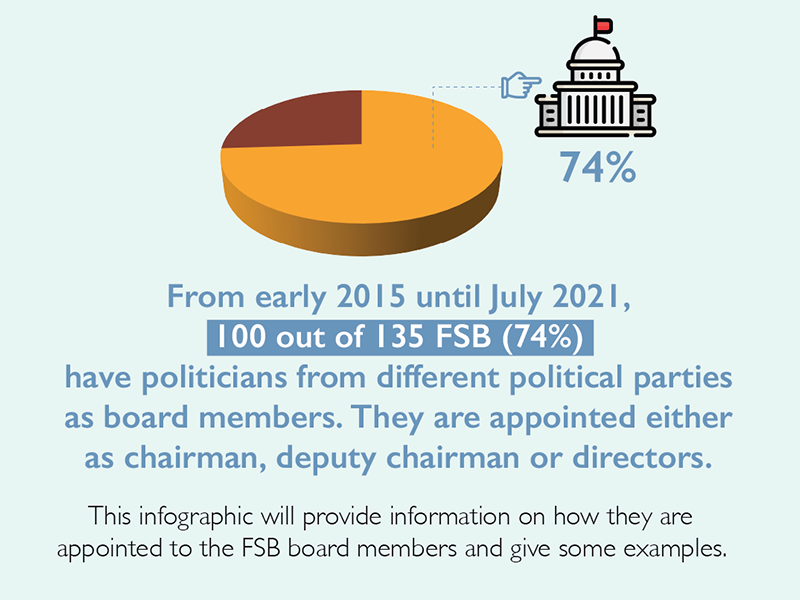
Broadly speaking, political appointment in Federal Statutory Bodies in Malaysia is not an alien practice. This can be seen by the significant numbers of FSB that have politicians joined the board. The above infographic shows the number of political appointments from the year 2015 until July 2021.
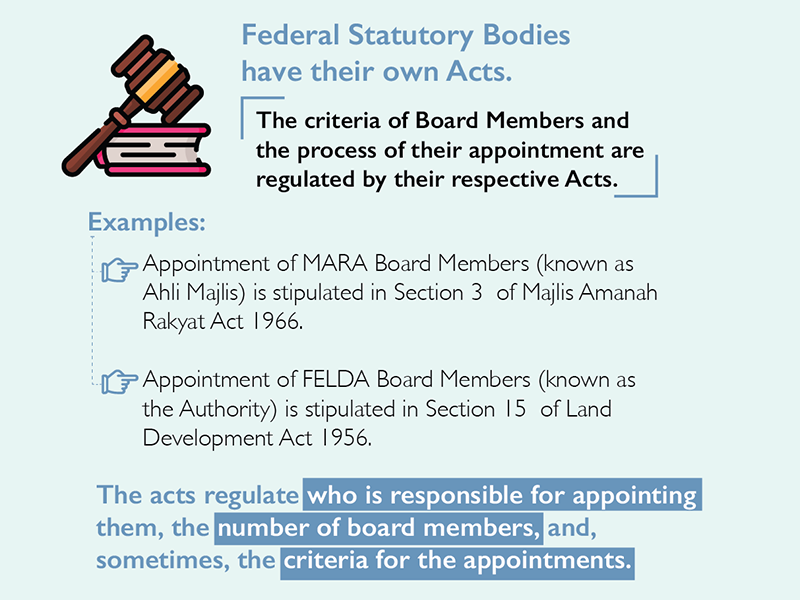
The above infographic shows an example of what's meant by the appointment of board members are regulated by the act.
For instance, the appointment of Majlis Amanah Rakyat (MARA) board members known as Ahli Majlis (according to the act) as stipulated in Section 3 of MARA Act 1966 and FELDA board members in Section 15 of Land Development Act 1956. Usually, the entire section of the act would list and explain the board members’ composition of the FSB.
Who can appoint?
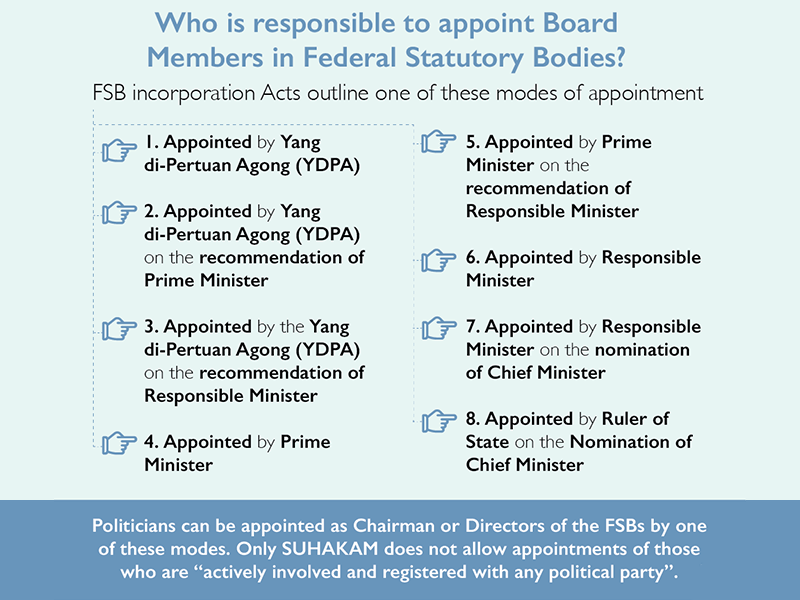
Who is responsible to appoint board members in FSBs are outlined in their respective act. Therefore, we can categorize the mode of appointment into eight types of appointment mandate:
1. Appointed by Yang di-Pertuan Agong.
Example: Section 5(1) of BERNAMA Act 1967 - The management of Bernama shall be vested in a Board of Governors (in this Act referred to as "the Board") which shall comprise not less than eleven nor more than thirteen members appointed by the Yang di-Pertuan Agong.
2. Appointed by Yang di-Pertuan Agong on the recommendation of the Prime Minister.
Example: Section 5(1) Human Rights Commission of Malaysia Act 1999, the regulation act for Suruhanjaya Hak Asasi Manusia (SUHAKAM) - The Commission shall consist of not more than twenty members. (2) Members of the Commission shall be appointed by the Yang di-Pertuan Agong, on the recommendation of the Prime Minister.
3. Appointed by Yang di-Pertuan Agong on the recommendation of the Responsible Minister.
Example: Section 10(2) of Administration of Islamic Law (Federal Territories) Act 1993, the regulation act for Majlis Agama Islam Wilayah Persekutuan (MAIWP) - The Chairman, Deputy Chairman, and the members under paragraph (1)(h) shall be persons who are Muslims and shall be appointed by the Yang di-Pertuan Agong on the advice of the Minister for such term, not exceeding three years, as the Yang di-Pertuan Agong may determine.
4. Appointed by Prime Minister
Example: Five persons among board members of the East Coast Economic Region Development Council (ECERDC) are to be appointed by the Prime Minister.
5. Appointed by Prime Minister on the recommendation of Responsible Minister
Example: Three persons among the board members of Langkawi Development Authority (LADA) are to be appointed by the Prime Minister on the recommendation of the responsible Minister.
6. Appointed by Responsible Minister
Example: All board members including the Chairman and Deputy Chairman of Lembaga Kemajuan Kelantan Selatan (KESEDAR) are to be appointed by the Responsible Minister.
7. Appointed by Responsible Minister on the nomination of Chief Minister
Example: Two persons among the board members of Perbadanan Padang Golf Subang (PPGS) are to be appointed by the Responsible Minister on the nomination of the Chief Minister of Selangor.
8. Appointed by Ruler of State on the nomination of Chief Minister
Example: Two persons among the board members of Perbadanan Putrajaya (PPj) is to be appointed by the Ruler of State of Selangor on the nomination of the Chief Minister of Selangor
One Federal Statutory Body can have more than one mode of appointment in the composition of its board members. For example, it can be that the chairman is appointed by the Yang di-Pertuan Agong while other members are appointed by the responsible minister.
Politicians can be appointed as board members of the FSBs by one of the above modes. Only SUHAKAM does not allow the appointment of those who are actively involved and registered with any political party.
Who can be appointed and what are the additional criteria?
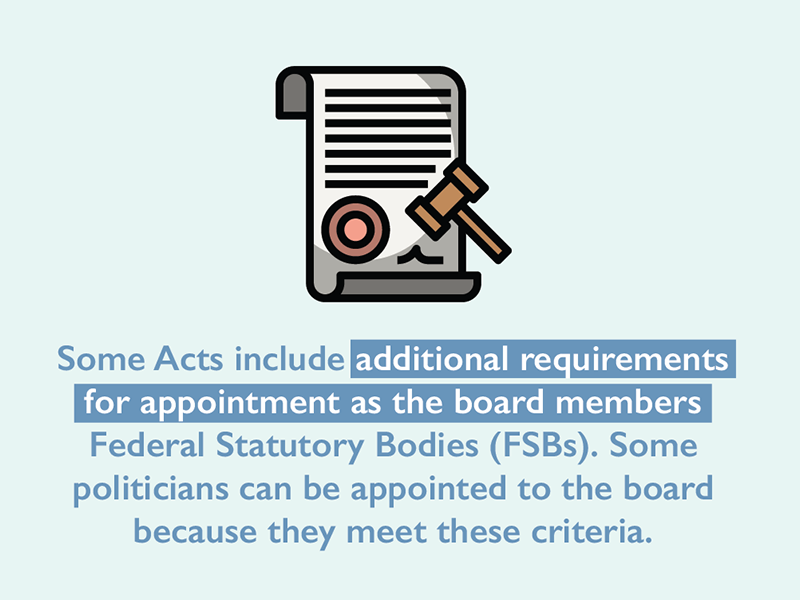
Besides the mode of appointments, some regulation acts of FSBs include additional requirements for appointment as the board members.
Anyone who meets the criteria can be appointed, including politicians. In that sense, politicians can only be appointed if they have the required qualification.
Let’s see some examples of additional requirements that are commonly mentioned in the act.
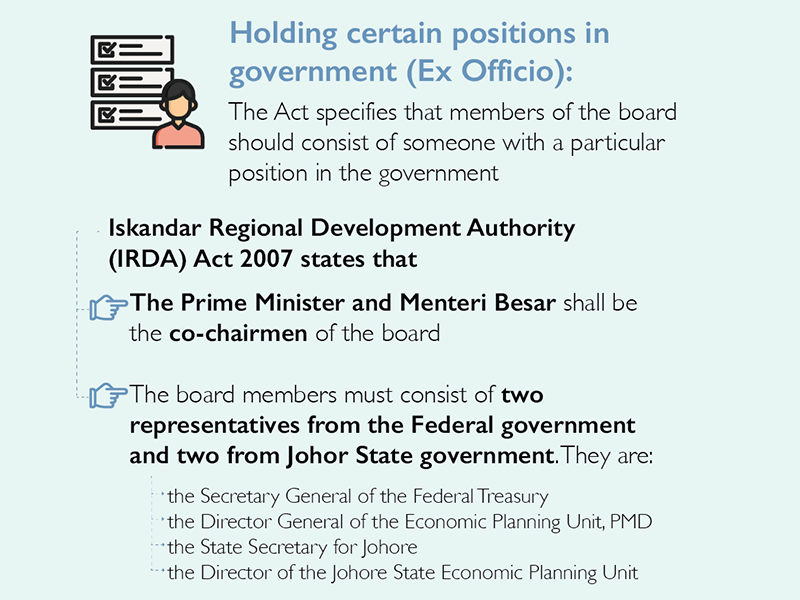
The first additional criteria that is usually outlined by the act is to hold a certain position in government (Ex Officio). The act specifies that members of the board should consist of someone with a particular position in the government.
For illustration, the Iskandar Regional Development Authority (IRDA) Act 2007 states that the Prime Minister and Menteri Besar of Johor shall be the Co-Chairman of IRDA. The board members must consist of two representatives from the Federal government and two from Johor State government.
The regulation act would list down what Ex Officio position needed as an additional requirement for board members appointment. Any person who holds that position will automatically gain membership of the board.
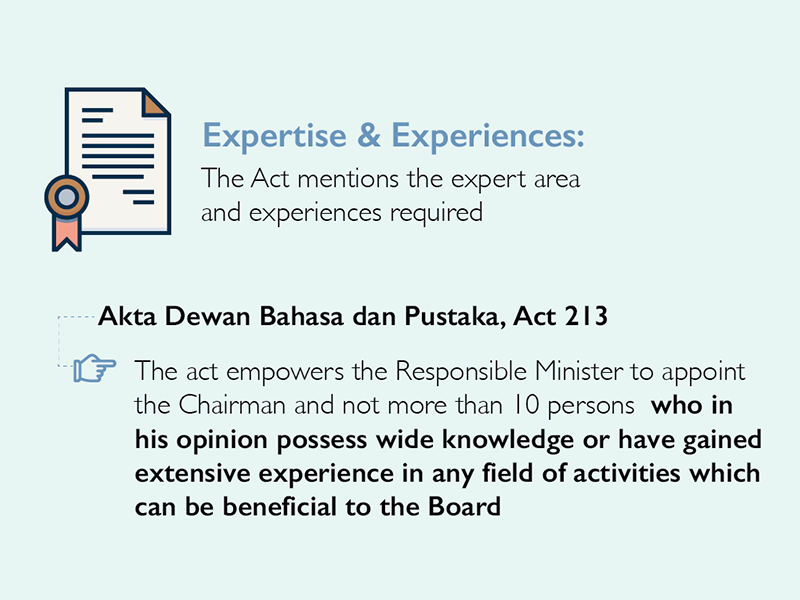
The second additional requirement is based on expertise and experience. These criteria are the most common since most of the FSBs’ regulation act would require certain qualifications in the form of expert area and experience in particular matters.
For example, Akta Dewan Bahasa dan Pustaka, Act 213 empowers the Responsible Minister of Dewan Bahasa dan Pustaka (DBP) to appoint the Chairman and not more than 10 persons who, in his opinion, possess wide knowledge or have gained extensive experience in any field of activities which can be beneficial to the board.
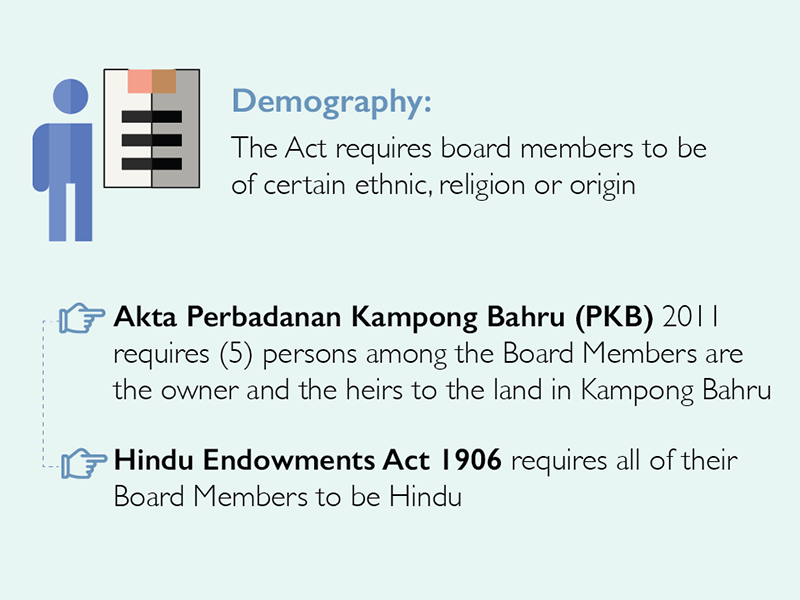
Last but not least, FSBs outlined the demography aspect of its board members. In other words, the act requires board members to be of a certain ethnicity, religion or origin. Generally, it is based on the nature and the function of the FSBs.
For instance, Akta Perbadanan Kampong Bahru (PKB) 2011, requires five persons among the board members of Perbadanan Kampong Bahru (PKB) to be the owner and the heirs to the land in Kampong Bahru.
Conclusion
The appointment of board members of the FSBs are governed by their respective regulation act.
The participation of politicians in FSBs or the occurrence of political appointments in some FSBs are allowed by the act itself due to the absence of a clause or section that says politicians are not allowed, except for SUHAKAM.
Political appointment in that sense is right by law. But is it right by ethics? To a certain extent, it obviously can cause a conflict of interest. Can we guarantee that the appointment is genuine?
Soon we will share more findings on political appointments in FSBs. From there, we can analyze together to formulate an answer for those vital questions.
More Stories



© Copyright - 2022 | ideas.org.my | Institute for Democracy and Economic Affairs (IDEAS)